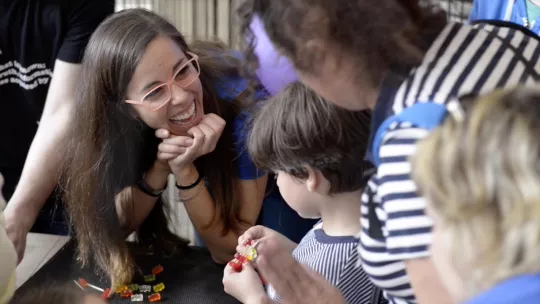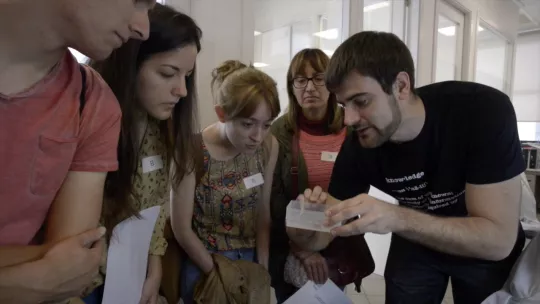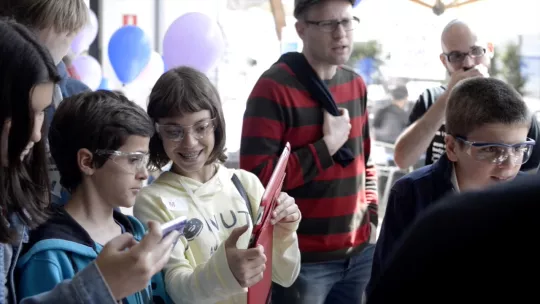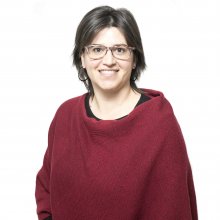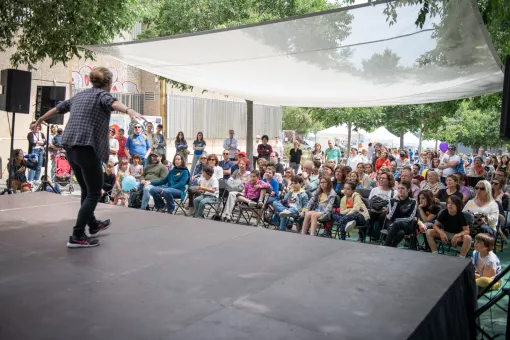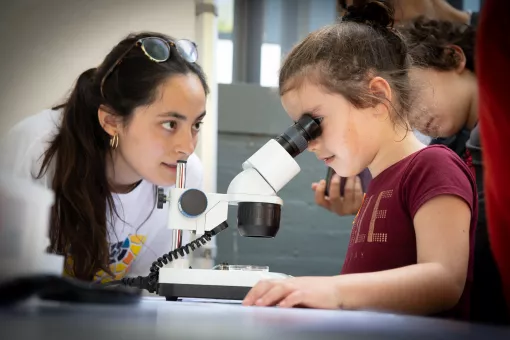Images
On May 13, IRB Barcelona will be holding its Open Day, from 10:00 to 15:00, and almost all the places have been reserved.
Audiences of all ages will visit the laboratories, participate in workshops, and attend informative talks at the Institute, which is located in the Barcelona Science Park.
Discovering how to use a microscope built with Lego blocks and take photos with a mobile phone, making "cellular spheres", and eating ice cream made with liquid nitrogen are some of the multiple activities that IRB Barcelona has prepared for participants of all ages in its forthcoming Open Day. To be held on Saturday May 13, the event will also include informative talks on cancer and diabetes and guided visits around labs.
With the aim to satisfy scientific curiosity and bring the work of scientists closer to the general public, from 10:00 to 15:00 the Institute will be hosting around 400 visitors who wish to become familiar with the research performed on its premises. Almost all the places have been reserved and each of the three programmed tours proposed for this second edition of the Open Day has a waiting list.
"Research is important for the development of society, but it is also exciting and when there is a willingness to explain it, research is easy to understand and you will fall in love with it," explains Joan J. Guinovart, director of IRB Barcelona and an active promotor of science in society also during the Open Day, where he will give a talk on diabetes, a disease "that is increasing alarmingly in large part due to poor eating habits and a sedentary lifestyle."
More than 80 volunteers are already "warming up" to welcome the visitors and to guide and assist them during the visit. "Everyone is very excited about the event. There will be a lot to see, to listen to and, above all to ask questions about," explains Muriel Arimon, Public Engagement and Science Education Officer at IRB Barcelona. The volunteers also include the 24 secondary school students participating in the 5th “Crazy About Biomedicine” course within the series “Crazy About Science”, run by the Fundació Catalunya – La Pedrera.
Activities for the most curious
The tours will include an informative talk followed by guided visits around labs. Elena Sancho, associate researcher in the Colorectal Cancer Laboratory at IRB Barcelona, will talk about the future of cancer treatment. Joan J. Guinovart, director of IRB Barcelona and group leader of the Metabolic Engineering and Diabetes Therapy Lab, will address diabetes. There will also be a special tour aimed at children, with an inventive scientific show given by the theatre group Clowntifics.
All the tours will be rounded off at the science fair, which will offer first-person science experiences designed for all ages. The visitors will be able to use the LegoLish-Mot, an innovative fluorescence microscope built with Lego blocks that was presented during the first Youth Mobile Festival Barcelona (YoMo Barcelona), celebrated last February. They will also have the opportunity to observe the tiniest details of the fruit fly Drosophila melanogaster and to make "spheres" (like the chef Ferran Adrià) to understand the cells in a workshop run by Barcelona Fun Science.
For the youngest members of the family, fun activities are planned for the science fair. Children will be able to build a DNA molecule or use liquid nitrogen—the same nitrogen used by researchers to freeze and preserve biological samples—to make ice cream, as well as participate in other surprising workshops. (See the complete list of activities).
The fair will also offer visitors information related to academic opportunities for young budding scientists and the outreach and fundraising activities held at IRB Barcelona.
The Open Day at IRB Barcelona is supported by the Barcelona City Council and the Spanish Foundation for Science and Technology (FECYT) of the Ministry of Economy and Competitiveness, and it forms part of the Institute’s public engagement activities aimed to inform the society about its work and to encourage open dialogue about a field of science that is likely to have a huge impact on people’s lives.
About IRB Barcelona
Created in 2005 by the Generalitat de Catalunya (Government of Catalonia) and University of Barcelona, IRB Barcelona is a Severo Ochoa Centre of Excellence, a seal that was awarded in 2011. The institute is devoted to conducting research of excellence in biomedicine and to transferring results to clinical practice, thus improving people’s quality of life, while simultaneously promoting the training of outstanding researchers, technology transfer, and public communication of science. Its 24 laboratories and seven core facilities address basic questions in biology and are orientated to diseases such as cancer, metastasis, Alzheimer’s, diabetes, and rare conditions. IRB Barcelona is an international centre that hosts more than 400 employees and 36 nationalities. It is located in the Barcelona Science Park. IRB Barcelona forms part of the Barcelona Institute of Science and Technology (BIST) and the “Xarxa de Centres de Recerca de Catalunya” (CERCA).
About IRB Barcelona
The Institute for Research in Biomedicine (IRB Barcelona) pursues a society free of disease. To this end, it conducts multidisciplinary research of excellence to cure cancer and other diseases linked to ageing. It establishes technology transfer agreements with the pharmaceutical industry and major hospitals to bring research results closer to society, and organises a range of science outreach activities to engage the public in an open dialogue. IRB Barcelona is an international centre that hosts 400 researchers and more than 30 nationalities. Recognised as a Severo Ochoa Centre of Excellence since 2011, IRB Barcelona is a CERCA centre and member of the Barcelona Institute of Science and Technology (BIST).

